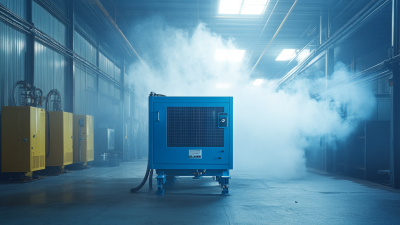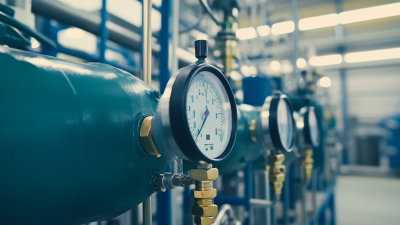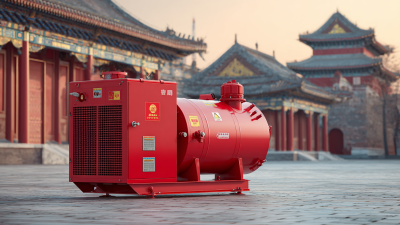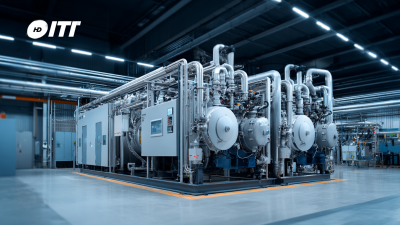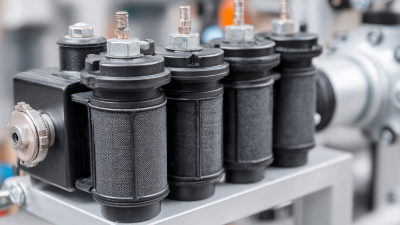
- sales@bjbod.com
- Mon - Sat at 7:00AM to 9:00PM

In the realm of industrial air systems, the importance of a high-quality Compressed Air Filter cannot be overstated. According to reports from the CAGI (Compressed Air and Gas Institute), nearly 70% of compressed air system failures can be attributed to contamination caused by particulates, water, and oil. Such pollutants not only compromise the efficiency of air-operated equipment but can also lead to increased energy consumption and maintenance costs, with operational expenses skyrocketing to upwards of 30% due to unfiltered air. Therefore, ensuring the integrity of compressed air through effective filtration is paramount for operational efficiency and cost-effectiveness. This guide aims to illuminate the critical role that Compressed Air Filters play in maintaining clean and reliable air systems, equipping professionals with the knowledge required to optimize their filtration choices and enhance their system's performance.

Compressed air filters play a crucial role in maintaining high air quality standards in industrial environments. By effectively removing contaminants such as dust, water, and oil from compressed air systems, these filters ensure that the air used in manufacturing processes, pneumatic tools, and other applications remains clean and free from impurities. Contaminated air can lead to equipment malfunctions, increased wear and tear, and compromised product quality, making it essential for industries to invest in reliable filtration systems.
The importance of compressed air filters extends beyond just equipment protection; they also contribute to overall operational efficiency. Clean air reduces energy consumption, as compressors do not have to work as hard to maintain pressure when the air is free of contaminants. Furthermore, the use of high-quality air filters can help companies comply with regulatory standards and improve workplace safety. In this way, compressed air filters are not merely maintenance tools but vital components of an efficient and sustainable industrial air quality management strategy.
This chart illustrates the average removal efficiency of various contaminants by compressed air filters. Ensuring high removal efficiency is crucial for maintaining air quality in industrial environments.
Compressed air filters are crucial components in ensuring the efficiency and cleanliness of air systems across various industries. There are several key types of filters, each designed to address specific contaminants. For instance, particulate filters are commonly used to remove solid particles such as dust, dirt, and rust, which can accumulate in the air supply and cause wear in pneumatic systems. These filters enhance the overall reliability and lifespan of the machinery by preventing abrasive damage.
Another essential type is the coalescing filter, which is effective in trapping liquid aerosols and oil mist. This filter works by combining tiny droplets of liquid into larger ones, which can then be easily removed from the air system. Coalescing filters are indispensable in industries like automotive and food processing, where the purity of compressed air is vital. Additionally, activated carbon filters are utilized to remove odors and vapors, ensuring that the air quality meets the stringent standards required in sensitive applications, such as pharmaceuticals and electronics manufacturing. Understanding these filter types and their applications is essential for optimizing the performance of compressed air systems.
| Filter Type | Application | Removal Efficiency | Industry Use | Maintenance Frequency |
|---|---|---|---|---|
| Particulate Filter | Removes solid particles | 99.9% | Manufacturing, Pharmaceutical | Monthly |
| Coalescing Filter | Removes water and oil aerosols | 99.99% | Food Processing, Chemical | Quarterly |
| Activated Carbon Filter | Removes odors and volatile organic compounds (VOCs) | 90-95% | Electronics, Automotive | Every 6 months |
| Desiccant Dryer | Removes moisture from air | Up to 99% | Metalworking, Textile | Annually |
Compressed air contains various contaminants such as moisture, oil, and particles that can significantly impact the efficiency of air systems. These impurities can lead to reduced pressure and energy loss, resulting in increased operational costs. When air quality is compromised, pneumatic tools and machinery may not function optimally, which can cause production delays and increase the risk of equipment failure.
Moreover, the presence of contaminants can shorten the lifespan of air-operated equipment. For instance, moisture can lead to corrosion in valves and cylinders, while oil can disrupt the functionality of lubricants within the system. Regular maintenance and effective filtration are crucial to mitigate these issues. By investing in high-quality compressed air filters, businesses can enhance system reliability and ultimately achieve a more productive and cost-effective operation. Therefore, understanding and addressing the impact of compressed air contaminants is essential for maintaining efficiency and extending the life of equipment in any air system.

Compressed air systems are essential in various industrial applications, yet many organizations overlook the significance of high-quality air filtration. Implementing superior air filtration systems can lead to significant cost savings by enhancing the overall efficiency of these systems. Clean air reduces wear and tear on machinery, minimizes energy consumption, and decreases the frequency of maintenance interventions, ultimately translating into lower operational costs.
Data-driven insights reveal that investing in quality air filters not only extends the lifespan of equipment but also improves product quality by preventing contamination. The initial expense of these filters is offset by the long-term financial benefits; companies report reduced downtime and fewer production disruptions. Additionally, as regulatory demands for cleaner air increase, adopting high-quality filtration becomes a necessary step for compliance, further guarding against potential fines and enhancing the company’s reputation in the market.
Proper maintenance and timely replacement of compressed air filters are essential to ensure the efficiency and longevity of air systems. According to a report from the Compressed Air and Gas Institute (CAGI), regular changes of filters can enhance energy efficiency by up to 30%. Neglecting filter maintenance can lead to increased pressure drops, which forces air compressors to work harder, ultimately raising operational costs significantly. Implementing a routine maintenance schedule can minimize these issues.
In terms of best practices, industries often recommend a preventive maintenance schedule where filters are inspected and replaced based on usage and environmental conditions. Utilizing pressure differential gauges can help in determining when a filter is clogged and needs replacement. Additionally, the U.S. Department of Energy states that proper filtration can help reduce contamination levels by 99%, which significantly impacts product quality and equipment life. By following these best practices, companies can maintain a cleaner and more efficient compressed air system.

